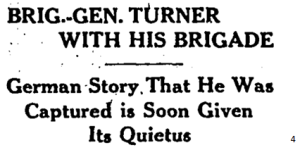Monday, June 7, 1915
Trenches, Givenchy
The Battalion War Diarist wrote nothing for day: “Quiet except for slight intermittent shelling by enemy, and constant sniping at certain points. At night sniping from fixed machine guns and rifles especially along Canal bank, shots mostly from south bank of Canal. Weathercock fixed at Battn. H.Q. to observe direction of wind for possible gas attack. This was first to be made use of in 1st Cdn. Division” [1]
THIS DAY IN RMR HISTORY: Throughout the war newspapers in the allied countries sometimes carried stories that later proved to be totally inaccurate. One such report is this one concerning Brig.-General Turner, commanding the 3rd Canadian Infantry Brigade of which the 14th Battalion was a part. It appeared in The Globe, Toronto on June 5th, 1915 and was confirmed as false two days later on June 7th.
 “(Special Cable Despatch to The Globe) Berlin, June 4 – (Via Wireless to Sayville) – Colonel [sic] Turner, in command of the 3rd Canadian Infantry Brigade, has been captured. Among the papers found in his possession was a division order saying that several men had been observed who had surrendered to the enemy without being shot by the officers or men, whose first duty it was to shoot every men trying to surrender.
“(Special Cable Despatch to The Globe) Berlin, June 4 – (Via Wireless to Sayville) – Colonel [sic] Turner, in command of the 3rd Canadian Infantry Brigade, has been captured. Among the papers found in his possession was a division order saying that several men had been observed who had surrendered to the enemy without being shot by the officers or men, whose first duty it was to shoot every men trying to surrender.
The order directed that if the body attempting to surrender was large enough artillery fire should immediately be directed at it.
Brigadier-General Turner, V.C., of Quebec, is in command of the 3rd (Highland) Brigade. Since the battle of Langemarck he has been several times mentioned in despatches. The Germans have been shooting their own men who attempt to surrender by the score, using artillery against them. The above report looks like an attempt to give the impression that this practice has to be followed by the British.
In the South African war he won the Victoria Cross for conspicuous bravery when the Boers seriously threatened to capture the guns. He was mentioned in despatches by Lord Roberts and Lord Kitchener.
There is no confirmation at Ottawa of the German report of the capture of the commander of the 3rd Brigade.” [3]
 “(Special Despatch to The Globe) Ottawa, June 6 – ‘General Turner is well and with his brigade’ is the answer to the strange piece of fiction which arrived on Friday night ‘via Sayville from Berlin,’ to the effect that the gallant Commander of the 3rd Brigade had been captured by the Germans. The Teutonic fabrication also declared that orders were found on General Turner’s person bidding Canadian officers turn the artillery upon Canadian troops who might show an inclination to surrender. The denial of the capture of General Turner was received from Col. J. J. Carrick, M.P., by the Minister of Militia at Poughkeepsie, N.Y., at 8:45 on Saturday night.
“(Special Despatch to The Globe) Ottawa, June 6 – ‘General Turner is well and with his brigade’ is the answer to the strange piece of fiction which arrived on Friday night ‘via Sayville from Berlin,’ to the effect that the gallant Commander of the 3rd Brigade had been captured by the Germans. The Teutonic fabrication also declared that orders were found on General Turner’s person bidding Canadian officers turn the artillery upon Canadian troops who might show an inclination to surrender. The denial of the capture of General Turner was received from Col. J. J. Carrick, M.P., by the Minister of Militia at Poughkeepsie, N.Y., at 8:45 on Saturday night.
General Hughes was in New York on Saturday morning and saw the headlines in the paper announcing the alleged capture of Brigadier-General Turner. He wired to his secretary in Ottawa and the latter cabled to Col. Carrick, who was at British headquarters in France. He immediately paid a personal visit to the Canadian line, found General Turner with his brigade and cabled back the intelligence.” [5]
[1] War Diary, 14th Canadian Battalion, The Royal Montreal Regiment, June 7, 1915. Library and Archives Canada, Ottawa http://data2.collectionscanada.ca/e/e044/e001089757.jpg
[2] “Brig.-Gen. Turner Taken, Says Berlin,” The Globe (1844-1936), Toronto, Ontario, Saturday, June 5, 1915, pg. 1, col. 4.
[3] Ibid
[4] “Brig.-Gen. Turner With His Brigade,” The Globe (1844-1936), Toronto, Ontario, Monday, June 7, 1915 pg. 1, col. 3.
[5] Ibid

